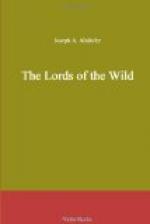The warriors around the fire uttered a universal yell of triumph when they saw the captain, and many of them ran forward to meet Grosvenor, whirling their tomahawks and knives in his face, and dancing about as if mad with joy. It was a truly ferocious scene, the like of which was witnessed thousands of times in the great North American forests, and Tayoga, softened by long contact with high types of white men, felt pity. The light from the great fire fell directly on Grosvenor’s face and showed its pallor. It was evident that he was weary through and through, but he tried to hold himself erect and he did not flinch when the sharp blades flashed close to his face. But Tayoga knew that his feelings had become blunted. Only the trained forest runner could keep steady in the face of such threats.
When they came near the fire, one of the warriors gave Grosvenor a push, and he fell amid cruel laughter. But he struggled to his feet again, stood a few minutes, and then sank down on a little hillock, where his captors left him alone for the present. Tayoga watched him thoughtfully. He knew that his presence in the Indian camp complicated their own situation. Robert would never hear of going away without an attempt at rescue and Tayoga’s own good heart moved him to the same course. Yet it would be almost impossible to take the young Englishman from the center of the Indian camp.
Tayoga knew too what grief his news would cause to young Lennox, between whom and Grosvenor a great friendship had been formed. For the matter of that, both the Onondaga and the hunter also were very partial to the Englishman.
The warriors presently untied Grosvenor’s hands and gave him some food. The captive ate a little—he had no appetite for more—and then tried to smooth out his hair and his clothing and to make himself more presentable. He also straightened his worn figure, and sat more erect. Tayoga gave silent approval. Here was a man! He might be a prisoner, and be in a most desperate plight, but he would present the best possible face to his foes. It was exactly what an Onondaga or a Mohawk warrior would do, and the young Englishman, though he knew little of the forest, was living up to its traditions.
“If he has to die,” reflected Tayoga, “he will die well. If his people hear that he has gone they will have no cause to be ashamed of the way in which he went. Here is the making of a great white warrior.”
The Onondaga knew that Robert and Willet were now expecting him back, but his interest in Grosvenor kept him a while longer, watching at the cliff’s rim. He thought it likely that Tandakora might come, and he had not long to wait. The huge Ojibway came striding through the bushes and into the circle of the firelight, his body bare as usual save for breech cloth, leggins and moccasins, and painted with the hideous devices so dear to the savage heart.




